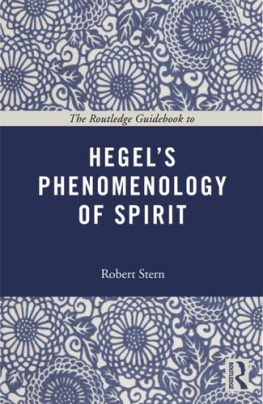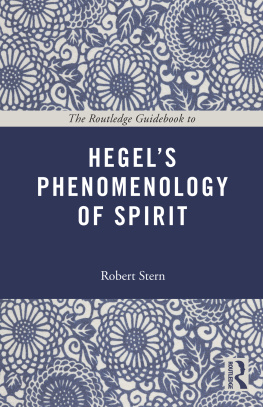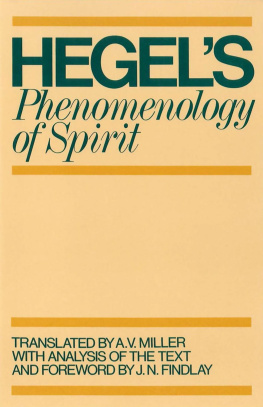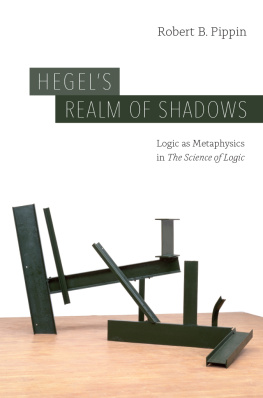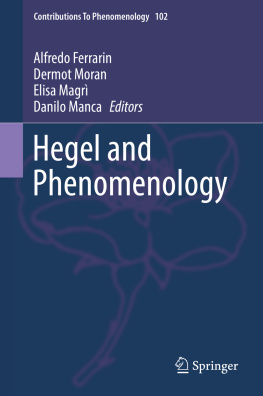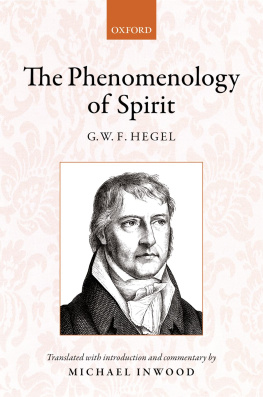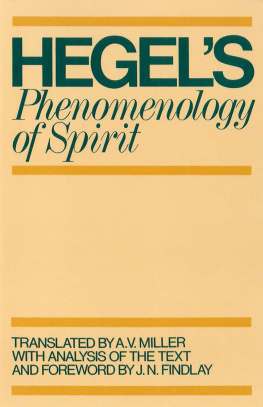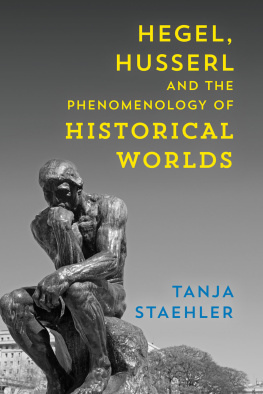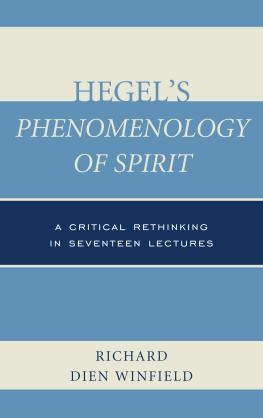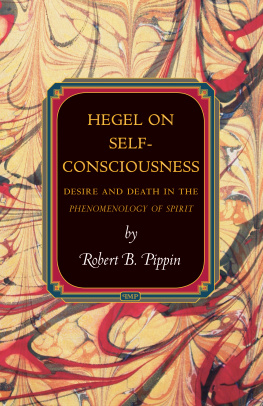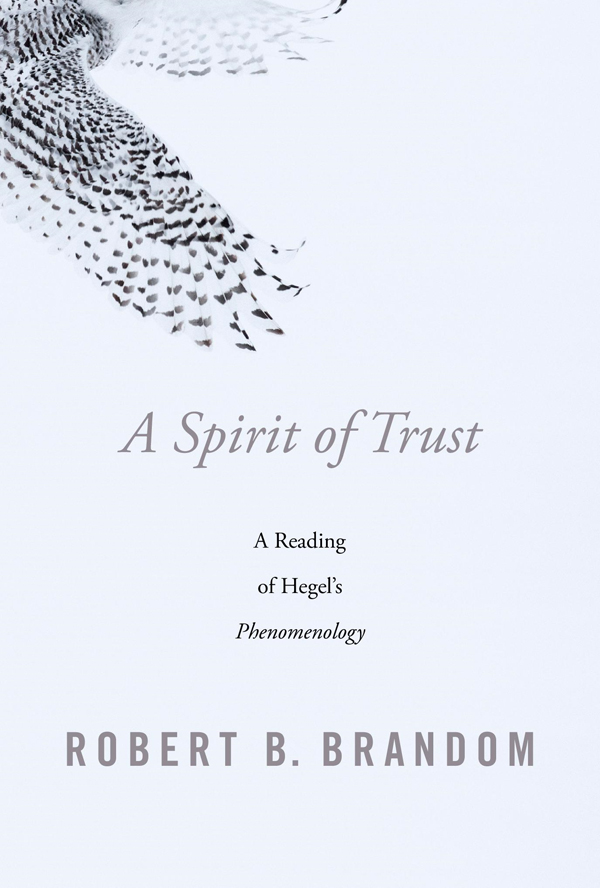Contents
Guide
Pagebreaks of the print version
A Spirit of Trust
A READING OF HEGELS PHENOMENOLOGY
Robert B. Brandom


THE BELKNAP PRESS OF HARVARD UNIVERSITY PRESS
Cambridge, Massachusetts, & London, England
2019
Copyright 2019 by the President and Fellows of Harvard College
All rights reserved
Cover design: Tim Jones
Cover photograph: Gallo Images / Getty Images
978-0-674-97681-8 (hardcover)
978-0-674-23907-4 (EPUB)
978-0-674-23908-1 (MOBI)
978-0-674-23906-7 (PDF)
.
The Library of Congress has cataloged the printed edition as follows:
Names: Brandom, Robert, author.
Title: A spirit of trust : a reading of Hegels Phenomenology / Robert B. Brandom.
Description: Cambridge, Massachusetts : The Belknap Press of Harvard University Press, 2019. | Includes bibliographical references and index.
Identifiers: LCCN 2018045114
Subjects: LCSH: Hegel, Georg Wilhelm Friedrich, 17701831. Phnomenologie des Geistes. | Phenomenology. | Objectivity. | Spirit. | Consciousness. | Truth.
Classification: LCC B2929 .B6928 2019 | DDC 193dc23
LC record available at https://lccn.loc.gov/2018045114
This is for John McDowell, my closest friend and dearest colleague for thirty years, who has loyally suffered along with me through the labyrinthine evolution of this storyeven though he thinks Ive got it wrong, and the peculiar genre of systematic hermeneutic metaconceptual creative nonfiction writing I am practicing here is in any case not his cup of tea.
Contents
Works by G. W. F. Hegel
PG | Phenomenology of Spirit, rev. ed., trans. A. V. Miller (Oxford: Oxford University Press, 1977). References are to paragraph numbers. |
PM | Hegels Philosophy of Mind: Part Three of the Encyclopedia of the Philosophical Sciences (1830), trans. William Wallace and A. V. Miller (Oxford: Clarendon Press, 1971). References are to page numbers. |
PR | Elements of the Philosophy of Right, trans. Allen W. Wood (Cambridge: Cambridge University Press, 1991). References are to section numbers. |
SL | Hegels Science of Logic, trans. A. V. Miller (Oxford: Oxford University Press, 1989). References are to page numbers. |
Works by Robert B. Brandom
AR | Articulating Reasons: An Introduction to Inferentialism (Cambridge, MA: Harvard University Press, 2001). |
BSD | Between Saying and Doing: Towards an Analytic Pragmatism (Oxford: Oxford University Press, 2008). |
FEE | From Empiricism to Expressivism: Brandom Reads Sellars (Cambridge, MA: Harvard University Press, 2015). |
MIE | Making It Explicit: Reasoning, Representing, and Discursive Commitment (Cambridge, MA: Harvard University Press, 1994). |
PP | Perspectives on Pragmatism: Classical, Recent, and Contemporary (Cambridge, MA: Harvard University Press, 2011). |
RP | Reason in Philosophy: Animating Ideas (Cambridge, MA: Harvard University Press, 2009). |
TMD | Tales of the Mighty Dead: Historical Essays in the Metaphysics of Intentionality (Cambridge, MA: Harvard University Press, 2002). |
WI | Wiedererinnerter Idealismus (Berlin: Suhrkamp Verlag, 2015). |
Works by Others
CDCM | Wilfrid Sellars, Counterfactuals, Disposition, and the Causal Modalities, in Minnesota Studies in the Philosophy of Science, vol. 2, ed. H. Feigl, M. Scriven, and G. Maxwell (Minneapolis: University of Minnesota Press, 1957). References are to section numbers. |
EPM | Wilfrid Sellars, Empiricism and the Philosophy of Mind, ed. Robert B. Brandom (Cambridge, MA: Harvard University Press, 1997). References are to section numbers. |
MW | John McDowell, Mind and World (Cambridge, MA: Harvard University Press, 1994). References are to page numbers. |
PI | Ludwig Wittgenstein, Philosophical Investigations, trans. G. E. M. Anscombe (Oxford: Basil Blackwell, 1968). References are to section numbers. |
TLP | Ludwig Wittgenstein, Tractatus Logico-Philosphicus, trans. C. K. Ogden (Mineola, NY: Dover Publications, 1998). References are to proposition numbers. |
This book presents a rational reconstruction of Hegels Phenomenology of Spirit. It traces a trajectory through that rich, sprawling Bildungsroman of modernity that reveals the cumulative expression and development of a set of apparently disparate philosophical insights and innovations, whose ramifications are gradually unified into what finally emerges as a single compelling line of thought. The narrative I retrospectively discern within Hegels is by no means the only one that can correctly and productively be recollected from the intricate and far-ranging story that he tells. Indeed, what is offered here is in many ways a severely selective reading. I am really concerned only with what he has to say insofar as it bears on one of the many topics he addresses. I believe it is an axial, organizing topic, and that focusing on it provides a useful perspective on all the rest. But the sharp focus involves real restrictions. Hewing rigorously to a thematic intensional restriction has extensional consequences: there are whole sections of the book, in other ways quite important ones, that are not so much as discussed here (for instance, Observing Reason, the entire Religion chapter, and substantial stretches of Spirit). Whatever does not show up as immediately bearing on and sufficiently advancing the emergence into explicitness of the account I see at the core of Hegels enterprise is ruthlessly put to one side. (By the end of this book, this methodological acknowledgment will be visible as having the characteristic form of a recollective confession. As such, it is accordingly also a trusting recognitive petition for forgiveness by more capable readersreaders, ideally, expressively empowered by whatever this reading does manage to reveal. But that is a lesson that lies far ahead of us at this point.)
The defining subject that serves as both lens and filter for the present account is conceptual content. At the very center of Hegels thought (to begin with, his metaphysics and logic) is a radically new conception of the conceptual. It understands as conceptually contentful anything that stands in relations of what he calls determinate negation and mediation to other such things. By determinate negation, Hegel means material incompatibility or Aristotelian contrariety: relations of exclusion of the sort that


